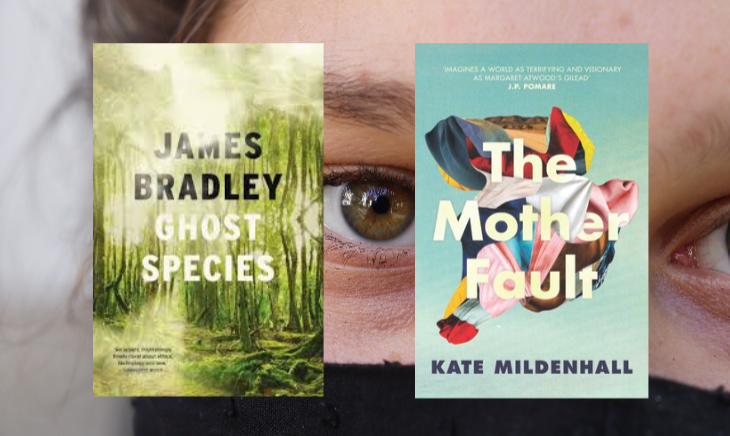
For an avid reader of dystopian and speculative fiction, often with an apocalyptic bent, bordering on cyberpunk or science fiction - think Ursula Le Guin's 'Left Hand of Darkness', Cormac Mc Carthy's 'The Road' or even a zombie apocalypse novel like Carey's 'The Girl with All the Gifts', I'm struck by how many books in the last couple of years have been much nearer to the future than I feel comfortable with, yet still immensely enjoy. Once these fictional worlds were set in far futures, extrapolating the worse possible case scenario that, if we simply heeded a few warnings, might be avoided.
It's only now that our world appears to be the worst possible case scenario. A number of books lately simply take what is happening now and imagine a world perhaps ten years in the future, as they imagine we are approaching midnight, and there is little time left to speculate. These worlds are terrifyingly familiar - pandemics, floods, climate refugees - all these are happening now and it takes little imagination to imagine them continuing on a far larger scale into a speculative future. There is no undoing.
Both James Bradley's novel 'Ghost Species' and Kate Mildenhall's 'The Mother Fault' also fall into the realm of the Australian Gothic for me - there is a sense of a dark past, a haunting sense of isolation and loneliness in their end of world at the end of the world - and an unforgiving environment that threatens the people in societies either in utter ruin, or close to it. But they also fall into the 'climate fiction' genre - new of course to the world of literature as it's authors grapple with the what-ifs of climate change.
James Bradley's novel 'Ghost Species' takes place in Tasmania as the world ends, a science lab where they bring to life extinct megafauna and modify plant species to try to combat the effects of climate change. The logical step for the arch evil scientist character is to engineer Neanderthals, a long extinct species from their own apocalyptic end thousands of years before, just as our own species face their demise. I read this novel as the fires raged in Australia in January - in an eery parellel, the characters suffer the choking smoke from the entire state burning, and then the pandemic - it was as if the dread in the novel was writ large in the real world. Not fiction, but a mirroring of what was. As a climate change commentator, the author is clearly begging that we don't ignore this clear and present danger, a ‘sense of hastening, a dislocation deep in the fabric of things’.
Davis wonders 'what we could learn from' the neanthedals, as if some kind of cross species dialogue could occur that might shed light on the crisis at hand. Morally, psychologically, ethically of course, this project has consequences - especially when abandoned, and the neanthedal child is truly the last of it's kind, a ghost amongst the nearly extinct homo sapiens as the suffer the planetary trauma they inflicted upon it and society completely unravels, unknits itself.
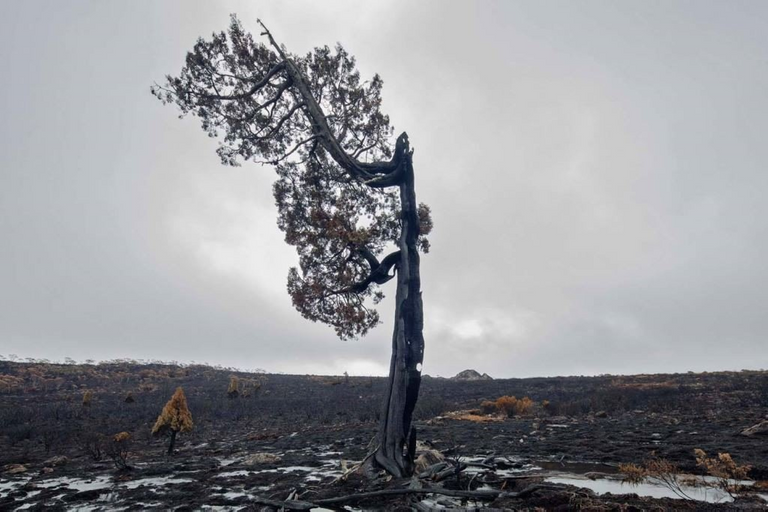
Image Source
One of the threads of the novel asks the question about whether it is ethical to bring a child into such a world. The child's surrogate mother absconds with the girl and raises her with love, despite the almost insurmountable differences between the two species. Still, love bonds are strong - all Kate does is with her daughter Eve in mind, though she can do little to halt the end of times for both earth time (floods, fires, earthquakes) and human time (disease, war, inability to adapt to the increasing temperatures and species extinction)' Of this dilemma Bradley writes
Despair is not an option if you’ve got kids. You’ve got to engage with the world and try and make it better. There’s no room for retreating and throwing your hands up and saying it’s all too hard. - Kill Your Darlings
It's this that makes the novel not just a warning about technology not always being a saviour, about a climate in very real crisis or billionaires thinking themselves visionaries and manipulating policy to suit their own ends, dark histories and science ethics, but very human experiences that are at the heart of every story.
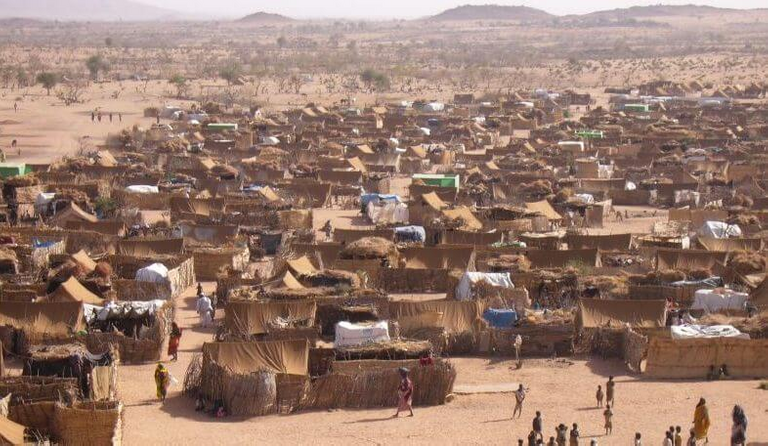
Image Source
This emotional experience is also at the heart of my most recent read, also a climate fiction, Kate Mildenhall's novel 'The Mother Fault' also asks us to empathise with the main character, a woman who finds herself fleeing her own country and becoming a refugee in an unsafe world where climate refugees huddle in camps in Darwin and species she remembers from childhood are all but extinct. Her brother becomes angry when she announces her pregnancy - how dare she have children in such a world? - but this isn't a decision Mim can make, or wants to.
The opening chapters had me a little concerned in a kind of clumsy explanation of the novel's dystopian setting. However, there was still a sense of intrigue and horror - this was not too inconcievable, given world events. The author detailed the demise of the political climate in Australia to something 'backed by big money and big ideology', a party voted in to provide answers to climate emergency, housing crisis, health and foreign policies. The resulting government is frightening - 'One Department, One Nation' that takes advantage of a terrorist attack at the MCG, a biothreat in Geelong (it is not often scenes in a novel take place in my closest large town) and nothing is 'sacred, nothing was safe. Not their money, nor their health, nor their football games'. This makes it easy for the Department to control the populace by making them believe it is their 'choice' - why wouldn't you get a micro chip if you were keeping your family safe?
The ensuing authority creep hardly caused a ripple. In this, the lucky country, the land of the lackadaisical larrikin, no one demanded you jumped on board the new system. No one legislated. No, it was much more powerful than that.
You got a chip to protect a mate.
You got a chip because you had nothing to hide.
Because we are all in this together.
I can't help but think of the new farewell phrase of 2020 and beyond: 'stay safe', friends will say, and I'm incensed that that was never said before, when the world was just as full of risk. We seem more afraid of death than ever, and as early in the pandemic showed us, even neighbours would dob in neighbours if they appeared to be breaking lockdown laws. Our state motto: 'Together, we're stronger'. Tow the line and do the right thing - the right thing we are told to do by state and federal governments, and everything will be fine and dandy.
Would we get a chip, if we were told it would keep us safe? That's one of the speculative questions the novel asks. As waves of floods, eco terrorist bombings and other disasters plague the nation, and the world, people were happy to get the implant. I am reminded of this year's attempt at QR code sign ins at restaurants, contact tracing, Coronavirus apps and of course the vaccine. Nothing is compulsory - but we happily sign up because we are made to be afraid, fear exacebrated by media. In 'The Mother Fault', the media is even more fed to them - the government decides what everyone should watch. Censorship of certain media, anyone? Freedom of speech is becoming an obsolete ideal.
But for Mim, compliance just happens:
When they brought in the legislation she was heavily pregnant and had to wait until she’d given birth before she could get herself chipped. And Essie. Easier to do it now for her, the smiling nurse had said, she won’t even remember the nick. Mim – leaking, weeping, feeling like she had been torn asunder – said, Yes, of course.
They did Mim first, a click, pearl of blood, nothing compared to the blind vortex of pain she’d just endured.
And then her tiny daughter, Essie, another click, a scream, eyes squeezed shut then open – the treachery of it! Of what she’d let them do to her. The nurse soothed, Now you’ll always know where she is. Doesn’t that feel wonderful?
She had grown this child, had been attached. How would she ever not know?
I will always know where you are, she had whispered.
It is this emotional manipulation that also has Mim sign papers that say that the Department will drive the narrative of the husband's disappearance, and hand over her passports. He is missing in Indonesia, where he works for a mining company - a risky job, in a world of geologically unstable. Then there is the threat of 'Best Life' - estates where the drug addicted, single mothers, at risk children and other social undesirables are taken in in a kind of new world social welfare system that's threatening and ominous.
Following her instincts, Mim has a vet friend remove the chips that are embedded in her and her children's skin, and takes off across the country, driving north with an old friend and lover by car and yacht to Indonesia to find out what happened to her husband. She would do absolutely anything for her children, though she is afraid that she is not capable, and must do things she never thought she could do to keep them out of the Department's grip.
The emotional element of this story is also tied to Australia's treatment of refugees, of course. It is clear to see the author humanising the refugee story - if it is one of our own, on the run from a government almost as bad as Atwood's Gilead - perhaps we can understand their desperation when they come knocking at our borders. This country has taken in refugees from political regimes and war many times - yet still, whenever there is social unrest, it's white Australia we protect, ready to look after our own. But how far are we really, from being wannabe refugees ourselves? From wanting to flee a heavily surveilled society it's own interests to look after, and to have to give up the land we love to fracking companies or rising sea levels?
It is not that she does not love Australia - it is rich with family and memories for her - but it is not tenable for her or her children to stay there: 'a place can be home, can feel like it's part of you, and yet you can want to run from it'.
Neither 'Ghost Species' or 'The Mother Fault' are comfortable reads as we observe a world suffering from climate stress and the related pandemic, but the emotional narrative they bring to the end times of which they write is compelling.
**This review was written for the January Book Review Contest on HIVE. You can join the community here.
With Love,
https://gateway.ipfs.io/ipfs/QmcGSZxvsXD8YbSCNAo6KWc4a9RjXyRCjWupZdPXJapkXk
Are you on HIVE yet? Earn for writing! Referral link for FREE account here

PeakD - The Best Way to Experience The Hive Blockchain
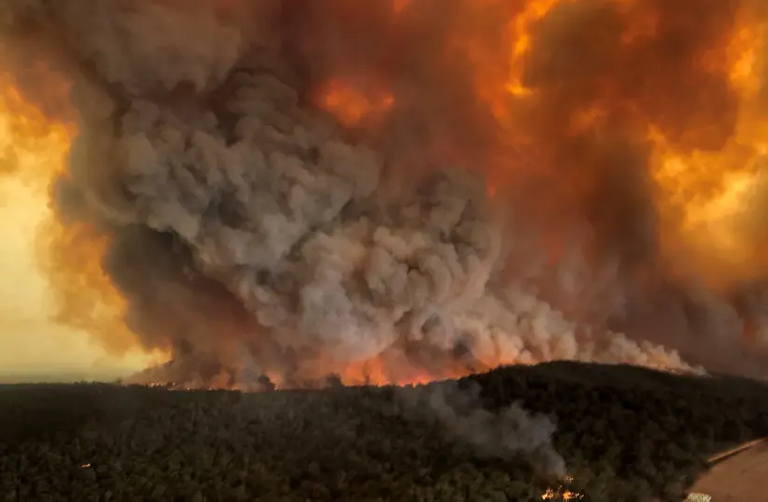
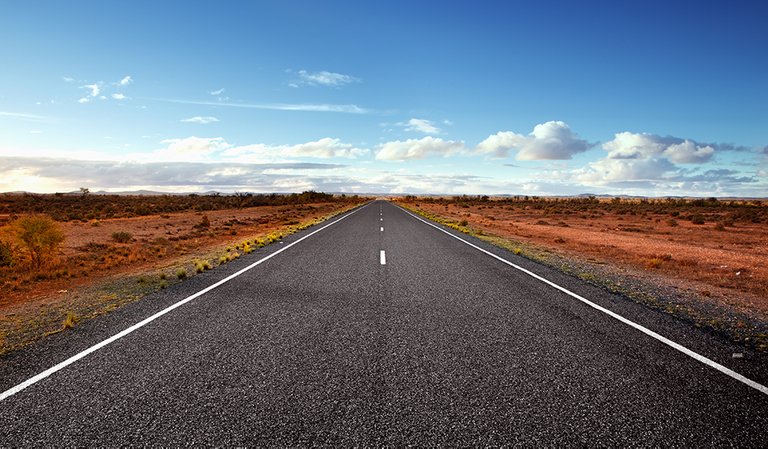
 Join The Best Natural Health Community on Hive
Join The Best Natural Health Community on Hive
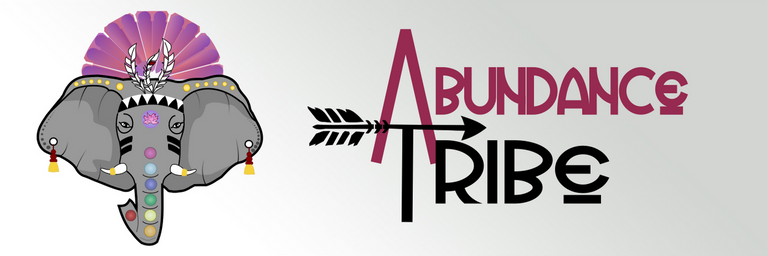

These look like the kind of books I'm going to add to my dystopic/apocalyptic sci-fi reading list.
I think I didn't have books dealing with climate change as the driving factor of the novel. And according to the well-constructed review they are the kind of punch in the gut one expects from these kind of books. Revealing the ins and outs of human behavior and our self-destructive nature.
The second one deals with the common political topics that make this fiction famous. It's always nice to see what would happen if governments did this and that. We have some great example in classics like A Brave New World, 1984 and other novels concerning politics driving the future and shaping it in a twisted way.
That sort of leitmotif connecting the stories with the bringing children into a messed-up world dilemma is a trending topic in our society nowadays and requires tons of heavy exploration. The kind only fiction can bear.
@bertrayo Thanks so much for your thoughtful comment.
If you are a fan of that kind of fiction, I think you'll enjoy these. Like myself, I think you enjoy them for the social commentary they provide and a chance to flesh out some moral and ethical dilemmas that have led society to this point and drive it forward.
The soma of Brave New World is not too different to the things that keep us oblivous in this age - they show up in various ways in modern novels too. The difference with these books is that they felt like now far more than 1984 did, even though Orwell was writing about what he was seeing in his cultural. political and social milieu.
Well said. LEt me know if you read them - they were both very good, although I thought The Mother Guilt was in some ways better. The Department was certainly almost as threatening as the Ministries of 1984, sans Room 101.
My pleasure, @riverflows.
I will definitely check them out. These social commentaries are a great way to widen my world perspective and give some thought to the human condition.
The future looks a lot like this. Corporations getting to watch everything we do and our consumption of media and other things as a way to ignore the reality. Those A Brave New World is more in line with our current society, the threat of the Big Brother watching over us keeps lurking around every corner.
Well, this is an excellent way to showcase a not so friendly government. Another Ministry of Love doing things is a twisted way!
That was a really good read. Lots of things I'd love to discuss but won't but I do want to hear your thoughts on one thing. It is something I hear alot. The ethical question about bringing kids into the world.
This is something I have heard alot, even with the world not ending people don't like the current world and say this. It is quite interesting because what is the purpose of life? That is a question we don't purely understand. If the world was ending would it be unethical? I think that is a selfish question. I always reflect on myself, is life perfect no. But do I enjoy living, yes. If the world was ending I would still have kids because it is not cruel. Because at the core of it, we would always choose life and to have lived and existed then never to not have.
I cherish every moment with my children as they cherish everyone with me (and their ipad) the world has been worse and the world has been on the brink of end on numerous occasions, people to still bring children up. Infact birthing rates increase in times of hardship. Perhaps they is the human psych trying to ensure it's greatest chances of survival.
I did however, enjoy this passage:
Despair is not an option if you’ve got kids. You’ve got to engage with the world and try and make it better. There’s no room for retreating and throwing your hands up and saying it’s all too hard. - Kill Your Darlings
Never a truer word spoken
!ENGAGE 50
Making a better world for your kids is imperative.
Our biological drive to have kids is not easy to ignore and as you say, sex and death go hand in hand - the worse things get, the more likely we are to procreate! But you can't stop love either, and children come and you love them so fiercely. It's such a beautiful human experience.
I don't know the answer, but if I was 25 again I probably would aim for 2 kids not one! We aren't card yet. But damn we could work a bit harder to make the world a better place for all the kids that come after, instead of putting profit.first.
The purpose of life to me is love and I don't think we always act from a place of love.. We act from greed, or fear, or selfishness. So if we do have kids, we have a responsibility to raise them right.
Thanks for stopping by, I enjoyed reviewing these books so it's nice to have someone kind enough to read and comment.
I wish I had more time to read more books, at the moment it is all work stuff. It really sucks.
You're right with those points and oh my, I was 30 when my partner and I first had kids. I wish we did it when we were younger but we were trying to get everything right. School, uni, work, house, slowly but surely getting there. We have two now. But I am so tired and I wanted more. Maybe, we will see what happens.
ENGAGEtokens.Damn it, girl - I suddenly want to reread Ursula LeGuin and that is not so easily done here in Thailand right now.... many of the 2nd hand book shops have CLOSED due to a year with no tourists (and therefore no juicy inflow of books). Hmmmm.... pondering. *There are days I think some kind of e-reader kindly 'thing' may be on my horizon but I DO so very much prefer an actual book.
Currently reading Helen Garner's diary. So very Australian/MEL/SYD that one wonders how she manages to sell books outside of Oz! Enjoying it thoroughly and reliving old Fitzroy days through other eyes.
You know, I read Monkey Grip every few years because of how familiarly Melbourne it is! I wouldn't mind reading her diary - will add to the list.
It's taken me a year to get back into reading... when do I decide books are the thing? Two weeks before school starts. Hot damn.
My fave of hers is 'the Word for World is Forest' - but I agree, only the real thing would suffice. However, I'd go an e-reader if there was nothing else on offer. Sorry your book world is so bereft!
My dear friend, Ken, sent me a care pack from Book Depository for christmas but it has yet to arrive. Ever hopeful. LOL.
2 weeks before back into teaching? Are you excited or bummed about that thought? A changed world methinks.
!ENGAGE 25
I'm having nightmares about flea bitten mischievous monkeys in the office, too small desks, mean staff, teaching naked, kids that won't listen, and not being able to find my keys.
I would say my dream world is a bit of a big tell.
Giving it a big talking to and using all my tools!
Ken sounds very kind.
!ENGAGE 25
The dream world is always a big tell!
You have changed a LOT in this last year and it's ok to consider a different future that doesn't involve teaching. Or teaching privately - differently.
One day at a time.
Oh yeah, I know. Not a good time to be changing careers, and only a couple of years will see us good. Rather get the money fast and then ease off working altogether - I'm grateful I have the means to do so. Who knows though - I might have a nervous breakdown by June holidays :P
What makes us uncomfortable can give us opportunities to grow - it's just how I reframe this that is going to see me start the working year with a positive note. I'm a good teacher and I will enjoy connecting to beautiful young minds again. It's not all bad.
ENGAGEtokens.ENGAGEtokens.Hi riverflows,
Visit curiehive.com or join the Curie Discord community to learn more.
Thankyou!
Thankyou!